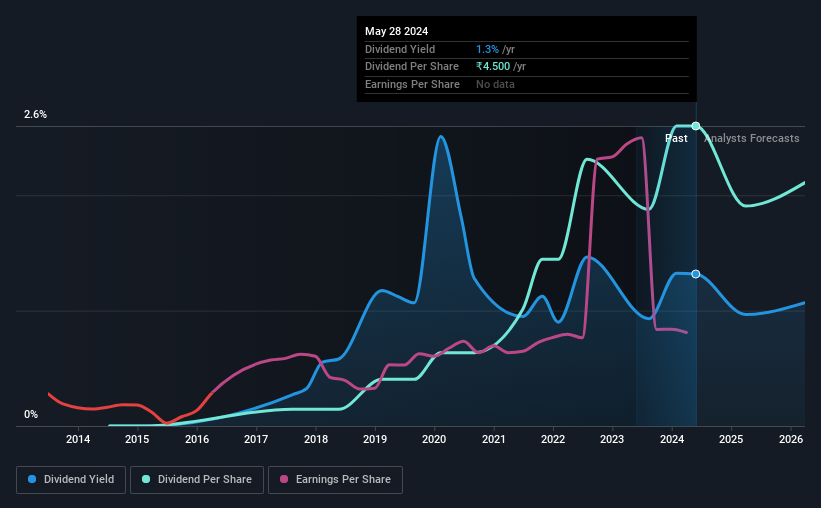Triveni Engineering & Industries (NSE:TRIVENI) Is Reducing Its Dividend To ₹1.25
Triveni Engineering & Industries Limited (NSE:TRIVENI) is reducing its dividend from last year's comparable payment to ₹1.25 on the 13th of October. This means the annual payment is 1.3% of the current stock price, which is above the average for the industry.
View our latest analysis for Triveni Engineering & Industries
Triveni Engineering & Industries' Dividend Is Well Covered By Earnings
A big dividend yield for a few years doesn't mean much if it can't be sustained. Prior to this announcement, Triveni Engineering & Industries' earnings easily covered the dividend, but free cash flows were negative. In general, we consider cash flow to be more important than earnings, so we would be cautious about relying on the sustainability of this dividend.
The next year is set to see EPS grow by 78.0%. If the dividend continues along recent trends, we estimate the payout ratio will be 18%, which is in the range that makes us comfortable with the sustainability of the dividend.

Triveni Engineering & Industries Doesn't Have A Long Payment History
The dividend's track record has been pretty solid, but with only 7 years of history we want to see a few more years of history before making any solid conclusions. Since 2017, the dividend has gone from ₹0.25 total annually to ₹4.50. This means that it has been growing its distributions at 51% per annum over that time. We're not overly excited about the relatively short history of dividend payments, however the dividend is growing at a nice rate and we might take a closer look.
The Dividend Looks Likely To Grow
Some investors will be chomping at the bit to buy some of the company's stock based on its dividend history. We are encouraged to see that Triveni Engineering & Industries has grown earnings per share at 17% per year over the past five years. A low payout ratio and decent growth suggests that the company is reinvesting well, and it also has plenty of room to increase the dividend over time.
Our Thoughts On Triveni Engineering & Industries' Dividend
Overall, it's not great to see that the dividend has been cut, but this might be explained by the payments being a bit high previously. While the low payout ratio is a redeeming feature, this is offset by the minimal cash to cover the payments. This company is not in the top tier of income providing stocks.
It's important to note that companies having a consistent dividend policy will generate greater investor confidence than those having an erratic one. Still, investors need to consider a host of other factors, apart from dividend payments, when analysing a company. Case in point: We've spotted 3 warning signs for Triveni Engineering & Industries (of which 1 makes us a bit uncomfortable!) you should know about. Looking for more high-yielding dividend ideas? Try our collection of strong dividend payers.
Valuation is complex, but we're here to simplify it.
Discover if Triveni Engineering & Industries might be undervalued or overvalued with our detailed analysis, featuring fair value estimates, potential risks, dividends, insider trades, and its financial condition.
Access Free AnalysisHave feedback on this article? Concerned about the content? Get in touch with us directly. Alternatively, email editorial-team (at) simplywallst.com.
This article by Simply Wall St is general in nature. We provide commentary based on historical data and analyst forecasts only using an unbiased methodology and our articles are not intended to be financial advice. It does not constitute a recommendation to buy or sell any stock, and does not take account of your objectives, or your financial situation. We aim to bring you long-term focused analysis driven by fundamental data. Note that our analysis may not factor in the latest price-sensitive company announcements or qualitative material. Simply Wall St has no position in any stocks mentioned.
About NSEI:TRIVENI
Triveni Engineering & Industries
Engages in the sugar and allied businesses, and engineering businesses in India and internationally.
Adequate balance sheet with moderate growth potential.
Similar Companies
Market Insights
Community Narratives



